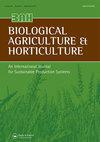Yield and nutrient concentrations of organic cherry tomatoes and legumes grown in intercropping systems in rotation with maize
IF 1.6
4区 农林科学
Q3 AGRONOMY
引用次数: 1
Abstract
ABSTRACT This study evaluated the productivity and nutrient concentrations of organic cherry tomatoes and leguminous green manures grown in intercropping systems in rotation with maize. The experimental design was a complete randomised block design with five replications and eight treatments, as follows: monocrop of cherry tomato adding residual maize crop residue (straw) as a mulch (control), monocrop of cherry tomato without the addition of maize crop residue (control), cherry tomatoes intercropped with jack bean, sun hemp, dwarf velvet bean, mung bean, white lupin or cowpea bean grown as green manures. In this production system, which was evaluated between 2011 and 2013, maize was cultivated from January to April, and the cherry tomatoes, with or without leguminous green manures, were grown from May/July to November/December. The number and weight of total and marketable fruits of tomatoes were 70% – 88% higher in 2011 than in 2012 and the number of damaged fruits was 12% lower in 2011 than in 2012. In 2011, the weights of total and marketable fruits in the intercropping treatment with white lupin were lower than that in the controls and in the intercropping treatments with dwarf velvet and cowpea bean. The white lupin and sun hemp green manures produced the highest biomass dry weight, followed by the jack bean, cowpea bean, mung bean and dwarf velvet bean. The different treatments had no effect on the yield of the maize.与玉米轮作的有机圣女果和豆类的产量和养分浓度
摘要本研究评价了玉米轮作系统中有机圣果和豆科绿肥的生产力和养分浓度。试验设计为完全随机区组设计,5个重复,8个处理,分别为:单茬樱桃番茄加玉米残茬(秸秆)作地膜(对照),单茬樱桃番茄不加玉米残茬(对照),间作青豆、太阳麻、矮绒豆、绿豆、白豆或豇豆作绿肥。在2011 - 2013年评价的该生产系统中,玉米种植时间为1 - 4月,圣女果种植时间为5 / 7月至11 / 12月,施用或不施用豆科绿肥。2011年番茄总果和可售果的数量和重量比2012年增加了70% ~ 88%,损坏果的数量比2012年减少了12%。2011年,白扁豆间作处理的总果重和可售果重均低于对照和矮绒与豇豆间作处理。白豆和太阳麻绿肥的生物量干重最高,其次是杰克豆、豇豆、绿豆和矮绒豆。不同处理对玉米产量没有影响。
本文章由计算机程序翻译,如有差异,请以英文原文为准。
求助全文
约1分钟内获得全文
求助全文
来源期刊
CiteScore
3.30
自引率
6.70%
发文量
18
审稿时长
>36 weeks
期刊介绍:
Biological Agriculture & Horticulture aims to act as the central focus for a wide range of studies into alternative systems of husbandry, and particularly the biological or organic approach to food production. The Journal publishes work of a sound scientific or economic nature related to any aspect of biological husbandry in agriculture, horticulture and forestry in both temperate and tropical conditions, including energy and water utilization, and environmental impact.

 求助内容:
求助内容: 应助结果提醒方式:
应助结果提醒方式:


